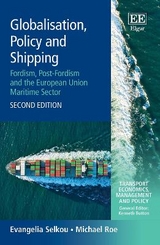
Globalisation, Policy and Shipping
Fordism, Post-Fordism and the European Union Maritime Sector
Seiten
2004
Edward Elgar Publishing Ltd (Verlag)
978-1-84376-934-7 (ISBN)
Edward Elgar Publishing Ltd (Verlag)
978-1-84376-934-7 (ISBN)
- Titel erscheint in neuer Auflage
- Artikel merken
Zu diesem Artikel existiert eine Nachauflage
The international shipping industry is the largest logistics provider in the world and is responsible for carrying around 95% of all freight products, including a large proportion of politically sensitive cargoes of crude oil. This book represents the first contemporary analysis of a number of significant and inter-related themes concerning the international shipping industry and its development in the context of increasing globalisation and supra-nationalism.The book concentrates on the issue of shipping policy and the relationships between policymakers and policy-enforcers at different spatial levels - international, supra-national and national. In an increasingly global sector, where ship-owners, cargo-owners, ship registration and crew might all be based in different countries, the authors question the role and authority of national shipping policies and their relevance compared to the growing significance of supra-national bodies such as the European Union. They illustrate this with a detailed case study of EU shipping policy and an analysis of the role of different member states.
Models of shipping development and activity are also introduced which provide a useful basis for understanding the industry at the turn of the millennium. In particular, models derived from the Neo and Post-Fordism debate are examined with respect to the structure which underlies trends towards a globalised economy.
This book provides a unique discussion of shipping policy in theory and practice, and will become required reading for researchers and students with an interest in maritime policy, decision-making, political science and organisational theory. It will also be of significant interest to transport policymakers and shipping experts.
Models of shipping development and activity are also introduced which provide a useful basis for understanding the industry at the turn of the millennium. In particular, models derived from the Neo and Post-Fordism debate are examined with respect to the structure which underlies trends towards a globalised economy.
This book provides a unique discussion of shipping policy in theory and practice, and will become required reading for researchers and students with an interest in maritime policy, decision-making, political science and organisational theory. It will also be of significant interest to transport policymakers and shipping experts.
Evangelia Selkou, Project Manager, Athens, Greece and University of Plymouth, UK and Michael Roe, Professor of Maritime Governance, University of Plymouth, UK
Contents: 1. Introduction 2. Setting the Scene 3. An Overview of National Shipping Policies – History and Development 4. International, Supra-national and National Shipping Policies 5. The European Union and Shipping: A Case Study of Policy-making 6. The Impact of Globalisation on the European Union Shipping Industry 7. Cohesion in European Shipping Policy: The Case of Tonnage Tax 8. Globalisation Conflicts and Dimensions: Neo and Post-Fordist Developments in Shipping Policy 9. Conclusions Bibliography Index
| Erscheint lt. Verlag | 27.8.2004 |
|---|---|
| Reihe/Serie | Transport Economics, Management and Policy series |
| Verlagsort | Cheltenham |
| Sprache | englisch |
| Maße | 156 x 234 mm |
| Themenwelt | Technik |
| ISBN-10 | 1-84376-934-4 / 1843769344 |
| ISBN-13 | 978-1-84376-934-7 / 9781843769347 |
| Zustand | Neuware |
| Informationen gemäß Produktsicherheitsverordnung (GPSR) | |
| Haben Sie eine Frage zum Produkt? |
Mehr entdecken
aus dem Bereich
aus dem Bereich
mit Berechnungshinweisen und Beispielen
Buch | Hardcover (2024)
Reguvis Fachmedien (Verlag)
56,00 €
Lern- und Arbeitsbuch (mit digitalem Training zum Downloaden)
Buch (2024)
SecuMedia (Verlag)
29,90 €



